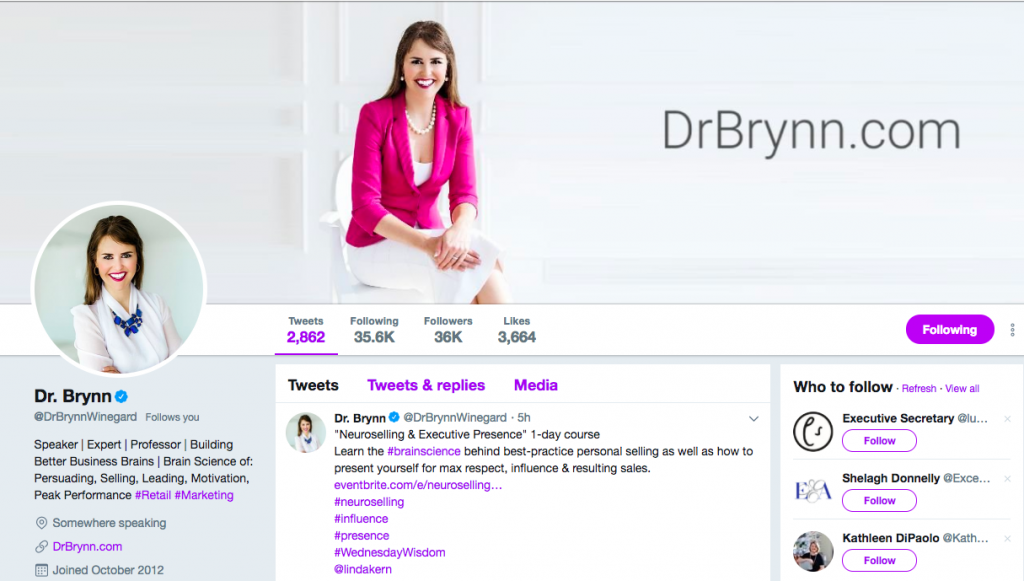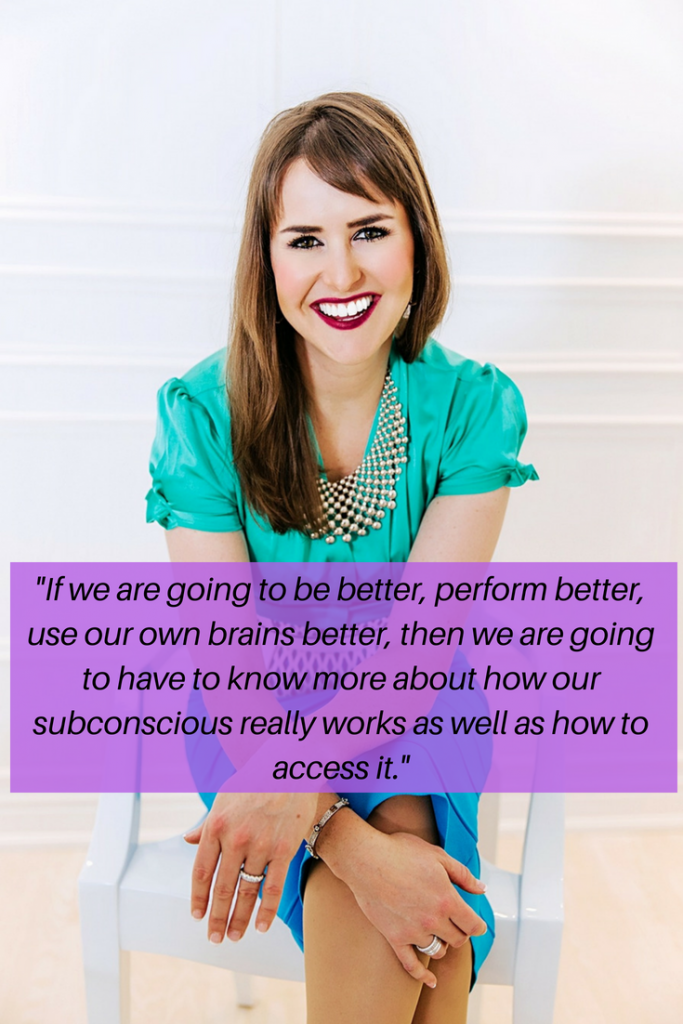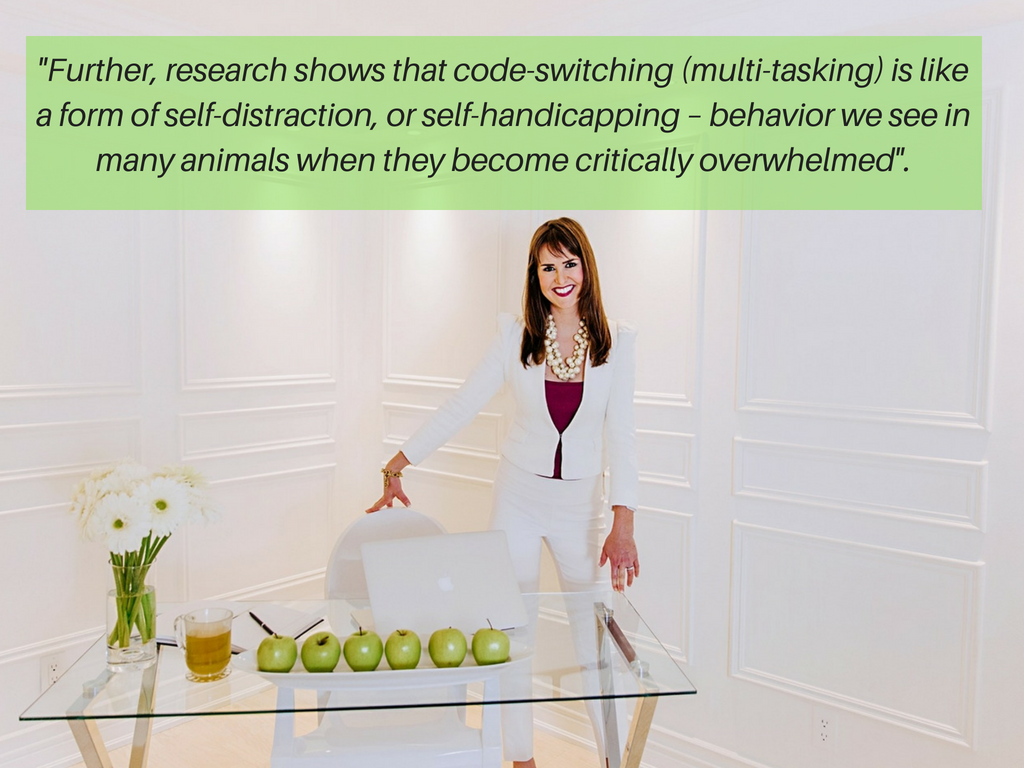We’ve all heard that in order to grow your business you must work harder and work smarter. We all assume that working smart means that we educate ourselves, learn to think creatively, and think of better ways to do things. But what if working smarter really means that you have to tap into an area of your brain that is not easily accessible?
As an entrepreneur, I’m always trying to find ways to grow and become more effective at what I do. That’s why when I first came across Dr. Brynn Winegard’s work I was very intrigued.
Dr. Brynn Winegard is an award-winning professor, speaker, and expert. Brynn completed her formal education in Neuroscience, Psychology, Marketing, and Strategy (HSBc, MBA, PhD), coupled with over a decade in corporate marketing working for Pfizer Inc., Nestle Inc., and Johnson & Johnson Inc. While Professor Winegard retains positions as Faculty at Schulich School of Business, DeGroote School of Business, and University of Guelph, she has now dedicated herself to helping others through speaking about ‘Building Better Business Brains’ to groups, organizations and companies, stemming from her research, which combines business and brain sciences.
You’re in for a treat today! I had the opportunity to ask Dr. Brynn some questions about her area of expertise, building a better business brain, and many other topics. Her answers were super insightful and a few blew me away! You’ll want to bookmark this interview and read it a few times so the information can really sink in.
When you’re finished reading the interview, don’t forget to share it on Twitter and follow Dr. Brynn while you’re there.
Q. Welcome to StartUp Mindset, Dr Brynn. We’re super excited to have you here. For those readers that are not familiar with you, could you tell us a little about yourself and your background?
Thank you for having me – honored to be here!
If I have one at all, my specialty would be in seeing patterns and opportunity for disciplines to inform each other; in merging disciplines – like business and brain-science, as an example. My first graduate studies were in brain sciences (e.g. psychology, neuroscience), and I fell in love: brain science was all I thought about, read about, cared about for a while. I was/am a real nerd.
At the time, I was also working in corporate marketing (Nestle; someone had to pay my bills!) and noticed that so much of what I was learning was applicable to my customers, the sales process, best-practice marketing – the intersection of these two disparate realms of my life at the time really fascinated me. While I was reading it in books, I really learned about ‘influence’ and ‘persuasion’, as example, by putting ‘foot to pavement’ so-to-speak in a sales role.
Psychology theory informed my sales process and struggling through the sales process informed my learning of Psychology. To this day, one of my favorite dichotomies is that of ‘theory and practice’, and the intersection of those two. Of course, this makes me an unconventional academician and thinker—one who insists on the ecological validity of theory: while I am an ‘idealist’ of sorts, for theory to make sense to me it has to make sense in practice, and vise versa.
Fortunately, this cognitive permutation has made me a reasonably effective teaching professor and speaker: students and audience members often tell me I am to explain to opaque theory to them in easy-to-understand examples that ‘bring it to life’.
Back in my ‘brain science days’, no one had ever heard of ‘neuromarketing’, ‘neuroleadership’, or ‘neuromanagement’ and the disciplines they became didn’t yet have names (further, most I tried to discuss it with seemed to think I was looney!). Disciplines like Industrial and Organizational Psychology were still in their relative infancy, with few scholars participating. Fortunately, in the last 15 years or so – with more accessible neural imaging and freedom of information – these disciplines have become increasingly reified while also being established as relevant business practices, much to my delight.
I have always been fascinated by the human brain and its inner workings – this malleable super-computer, 200 million years old, unique to each one of us, that controls everything about us, including how we perceive, react to, and experience the world. As a child of about 3 years I was asked what I wanted to be when I grew up and I wrote down ‘nerosirgin’, not knowing how exactly to spell ‘neurosurgeon’.
Years later I discovered I wanted to work on the brain – but not surgically. I have a former supervisor who always told me that “Research is ME-search!’, so your insight is as good as mine about what that means for me! Every day we are learning more about the human brain and it never ceases to amaze and delight me – like a deep sea adventure or space odyssey, but right inside your very own cranium, immediately accessible, totally personal. It is these frontier findings and the accompanying insights, wonder, passion that I bring to audiences.
Business people can benefit immediately from what science is constantly uncovering – they just need it unpacked, decrypted, and explained properly! Currently they have me ranked #7 in the world for human behavior experts in business.
Q. Your research looks at brain science and business science and merges the two. You really try to unlock the “black box of the brain”. Could you tell us more about what that means?
I have a passion for marrying practice with theory – it isn’t enough for me that something would be interesting in theory or in principle – I am always pushing for what it means in terms of how we can do our jobs more effectively, live our lives more fully, feel more contented, be more successful, become higher performers, feel more motivated, etc.
The truth is that our sense of agency, freedom of will, freedom of choice, available cognitive power are all dwarfed in light of how much processing happens subconsciously – we think something close to 99% of all cognitive ‘bandwidth’ is in fact subconscious. If we are going to be better, perform better, use our own brains better, than we are going to have to know more about how our subconscious really works as well as how to access it.
My passion on stage isn’t put on – audiences are getting the latest frontier research – and the resulting insights I mix with management science (what makes me a ‘business-brain scientist’) first-hand and fresh: I am genuinely excited about what our newest learnings can mean for audience members, at their jobs, in their lives. It is exciting and powerful to de-code highly technical research and use it to help people change their lives for the better!
Q. Many entrepreneurs who want to increase sales often try to convince their target market to buy by presenting facts, figures, and rationality. However, you believe that doing that is not the most effective way to persuade customers to buy.
Indeed – the subconscious (up to 99% of all neural processing) doesn’t operate on logic, rationality, facts or figures – it operates first and foremost using neural networks dedicated to social processing and secondarily to emotional stimuli (both intrinsic and extrinsic). If we want to drive sales, we have to better understand how the subconscious works, as well as how to tap into the subconscious of those we are attempting to persuade, influence, or have comply with us.
Q. I watched an interesting presentation you made on the topic of Influence and persuasion. During the presentation, you mentioned the 3 B’s of persuasion; belief, buy-in, and buy. Could you tell me more about the 3 B’s that you spoke about?
Thank you – yes, this is the keynote I often give about persuasion and influence as well the keynote I give about neuroleadership.
At the deepest part of the subconscious brain is what I call ‘the belief button’ – the part of the brain that decides whether it will believe you, buy into your ideas, or buy your product/service etc.
My training and keynotes get to how we can access that part of the brain by peeling away the layers of the subconscious in order to access the brain the way it wants to be accessed – in order to demonstrate the right signals that will allow others to be able to better read and understand us – as leaders, managers, sales people etc.
Q. One of the thing that many of our readers have told us they struggle with is increasing their personal productivity. What advice would you give to someone who wants to be more productive while running their business?
One of my favorite brain-based myths (and there are many!) is that multi-tasking exists: neuroscience proves that it doesn’t. The brain is a serial-processor that consciously does only one thing at a time. It is not a ‘parallel processor’, like most computers are. The analogy I often use is eating dinner with someone who eats their peas, then their carrots, and then their meat, all in order versus the diner who eats a bit of everything on the plate at the same time.
Your brain is the former – it does one thing at a time and then moves on to the next task. Many women, especially (likely because of a larger corpus callosum, but I digress), will assert that they are in fact great multi-taskers, when in fact what they are doing is ‘code-switching’, rapidly. Code-switching involves a refractory period wherein nothing gets done – drastically decreasing a person’s productivity.
What’s interesting is how many job descriptions and postings will call for ‘multi-tasking’ as a key trait of the successful candidate – not language or behavior we should be rewarding if we actually want the best for and out of our people! Further, as an entrepreneur or business-owner, you shouldn’t be expecting that of yourself either – remember to single-task and focus – this will get you much further in your day and tasks.
Further, research shows that code-switching is like a form of self-distraction, or self-handicapping – behavior we see in many animals when they become critically overwhelmed.
Accordingly, one thing you can do to increase your productivity would be to stop even attempting to multi-task. Instead, work the way the brain wants you to work – one thing at a time, in some logical sequence, separated by breaks of no more than 20 minutes, taking tasks from beginning to completion over a traceable length of time – this will increase productivity, efficacy, efficiency, focus, cognitive deliberateness, as well as ultimate satisfaction and endorphin release about a ‘job well done’!
Q. Are there any other exciting projects that you are involved in that you would like to tell us about?
Yes – by overwhelming popular demand I am working on a book – due out in 2019 on the brain-science secrets of higher motivation, productivity, and peak performance in all your do (at work and at home).
We are also working on another set of our popular video series “Dr. Brynn’s Brain-Based Productivity Boosters”: A new one is released every Monday as part of #mondaymotivation, #motivationmonday
In the shorter term expect opportunity for more Q & A – answered via video: people send us 100s of queries and questions on a weekly basis – soon we will start picking the best, most popular, most interesting, or most universal ones we get and answering them in a weekly “Q & A with Dr. Brynn” video series on our youtube channel – www.youtube.com/drbrynnlwinegard
Q. What one trait or mindset do you think every entrepreneur must possess in order to launch a successful venture?
I have been reading and researching a lot lately for upcoming projects and custom works. Most of the literature is on things like success, motivation, habits of achievers etc.
Amazingly, as broad as I read — works from business, political, organizational, neuroscience, social, individual motivational, weight loss, psychology scholars, even documentaries about moguls, you name it — they mostly can be distilled down to advocating for three factors of success. None of them easy, all of them simple.
Most works say some combination of “consistency and patience”. Though consistency is useless if you’re on the wrong path, no matter how patient you are.
Many advocate for “passion”, though passion isn’t in and of itself that prescriptive of success, except that it motivates ‘flow’ and action. Passion is actually useful for what I am going to say is success factor #2— FOCUS.
A deeper meta-anaylsis of these literatures could be done and more rigorous qualitative data analysis exacted, but here are the four, successive, factors for individual success I have deduced from my recent reading:
1) DIRECTION (a decided, envisioned end-goal or objective; ‘failing to plan is planning to fail’, ‘if you don’t know where you’re going, any road will take you there’)
2) FOCUS (unabated clarity of purpose; passion helps here)
3) CONSISTENCY (in doing the hard, worthwhile work, even and especially when the going gets tough)
4) PATIENCE (keep your head down and nose to grindstone and results will come before you think; ‘Rome wasn’t built in a day’) Our legacies really are the sum of our labors, so keep at it.
Also, it might be false, but it’s something my mother once said to me, and I often use when encouraging others or even myself through worthwhile but challenging things:
“If anyone can do it, you can.”
Simple and effective, I take it to mean that if it is possible at all, it is possible for you. I hear my mother’s voice saying it and often repeat it to myself whenever I need a confidence boost to undertake something or encouragement to continue something challenging. So just remember – if it is possible at all – it is possible for you, as long as you keep at it. ☺
Find Dr. Brynn online:












